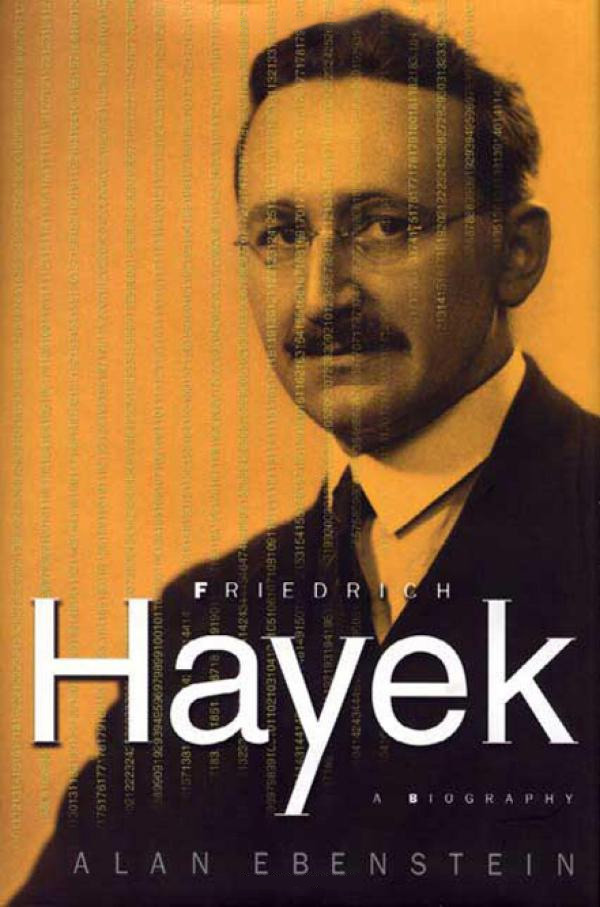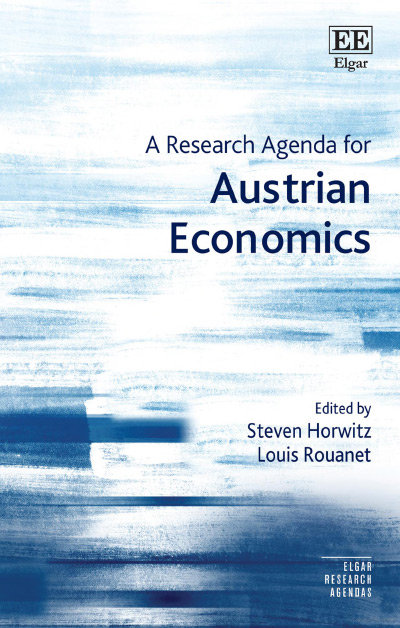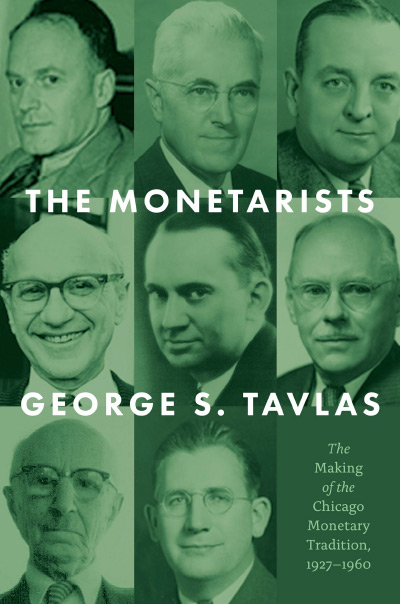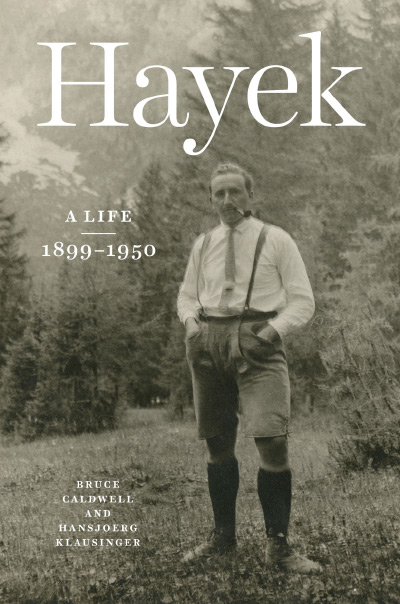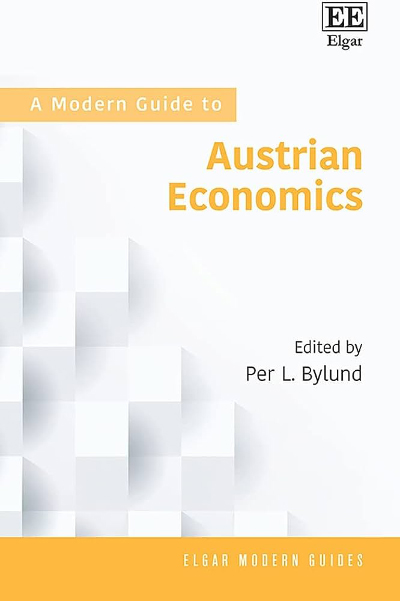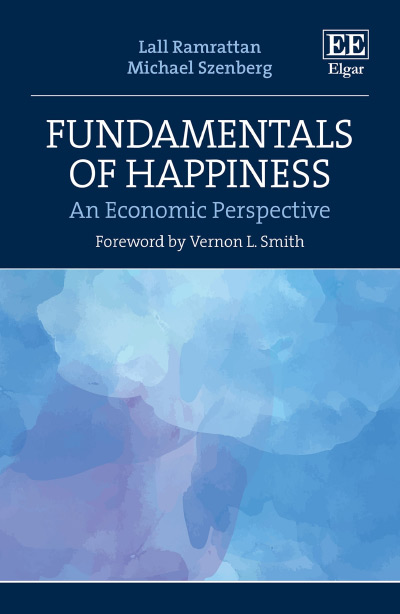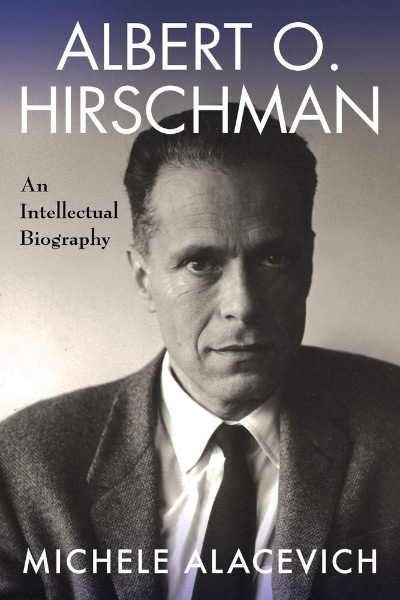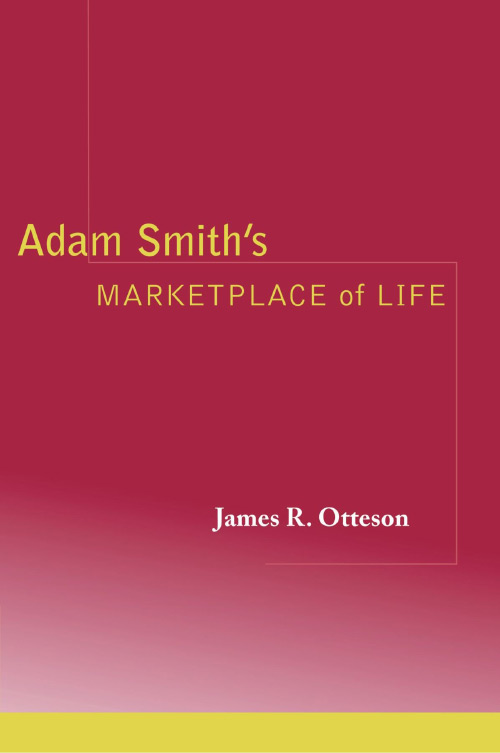Before reviewing Alan Ebenstein’s biography of F. A. Hayek, I think it is perhaps appropriate that I provide some background.
The philosopher Bill Bartley (to his readers, W. W. Bartley III) was to have been Hayek’s official biographer, as well as that of Karl Popper. No malingerer, Bartley was also the general editor of The Collected Works of F. A. Hayek; we owe the often brilliant but also sometimes idiosyncratic arrangement of pieces in that series to his vision. The ideas of collecting Hayek’s works and of writing a biography about him were themselves a natural outgrowth of a series of interviews that Hayek gave in the late 1970s under the auspices of the Oral History Program at UCLA. The interviews yielded a transcript of more than five hundred pages (“F. A. Hayek, Nobel Prize Winning Economist,” transcript of an interview conducted in 1978 under the auspices of the Oral History Program, University Library, UCLA, edited by Armen Alchian, copyright 1983, Regents of the University of California) that reveals many aspects of Hayek’s professional and personal life, his ideas, his opinions of others, and so on. It was and is a perfect starting place for reconstructing his intellectual and personal journey from Vienna to London to Chicago and beyond.
The first volume to appear in the Collected Works was Hayek’s last book, The Fatal Conceit, which Bartley assisted Hayek in putting together. Another volume in the series appeared, but then fate intervened when Bartley died at age fifty-three in 1990. Plans for an authorized biography passed with him. Stephen Kresge succeeded Bartley as the general editor of the Collected Works, and under his direction five more volumes have since appeared. Two biographical works have also come forth, though neither pretends to be a full biography. Hayek on Hayek: An Autobiographical Dialogue, edited by Kresge and Leif Wenar (Chicago: University of Chicago Press, 1994), draws on the UCLA interviews as well as on others, among them some that Bartley had conducted with Hayek in the 1980s. John Raybould’s Hayek: A Commemorative Album (London: Adam Smith Institute, 1999), produced with the cooperation of Hayek’s children, is filled with family photographs and memorabilia from Hayek’s personal and academic life.
A final bit of background, in the spirit of full disclosure: I am myself the editor of two of the volumes in the Collected Works, and I will be the editor of two more, once I finish my own biography of Hayek. The latter book will not, I think, compete directly with Ebenstein’s because my principal interest is to explain the development of Hayek’s thought and in particular his methodological thought, rather than to trace his life story.
Alan Ebenstein’s Friedrich Hayek: A Biography is, then, the first English-language biography of F. A. Hayek. The volume clearly represents a massive amount of investigative work. It has much to recommend it, not least that it offers up the facts of Hayek’s life in clear prose and with considerable detail. As I argue later in this review, however, it is not without flaws.
First, though, let us survey the book’s manifold virtues. Ebenstein has, in the first instance, put into chronological order and made more widely available the information in the UCLA transcripts. This undertaking was in itself a huge task. The interviews contain a vast amount of material, but they were conducted over a number of weeks, with nine different interviewers putting questions to Hayek, and the questions ranged all over the place. Seldom has there arisen a better example of spontaneous disorder, and Ebenstein has done much to rectify it. In addition, the interviews them-selves were never published, so only a few Hayek scholars have been able to make use of them. Ebenstein has done the considerable service of making this fascinating cache of materials both more widely available and more easily digestible.
Had those contributions been his only ones, the book would be well worth its purchase price, but Ebenstein has done much more. He talked to virtually everyone who knew Hayek, from family to friends to professional contacts, and he asked them the right questions. He scoured the secondary literature for remarks that others have made or for the odd, forgotten interview. He worked through a considerable amount of the material in the Hayek archives at the Hoover Institution. The end result is that he has gathered into one place virtually everything that has been written about Hayek’s life and personal relationships. The book represents a truly impressive amount of investigative work.
As a result, if you know nothing about Hayek’s life, this book is certainly for you. Moreover, I dare to predict that even if you think you know everything about Hayek’s life, you will discover things in this volume that you never knew. (Among the things I learned was the name that Hayek gave to Keynes’s multiplier when he was in Cambridge: the “Peter-Outer.” Brilliant! This tidbit gives me something to look forward to when next I teach Keynesian economics.) I also found particularly useful the confirmation of various stories that have long circulated but have never been put down in print about such things as the circumstances of Hayek’s first and second marriages, his move to Chicago, and his appointment to the Committee on Social Thought.
Ebenstein, then, has done a superb job of collecting and putting into usable form what already existed in print about Hayek’s life and of filling in most of the remaining holes by his own investigative efforts. Diminishing this considerable accomplishment is Ebenstein’s insistence on offering at various places throughout the book his own assessments of Hayek’s substantive work.
Hayek made contributions to the Austrian theory of the business cycle and to capital theory. He wrote about international monetary relationships and about the viability of socialism. His work on the role of knowledge in economics can be taken as both a contribution to and a critique of what mainstream economists call “the economics of information.” Were one to limit oneself just to summarizing his economic writings, the task would be huge, but Hayek also made contributions to political philosophy, the history of ideas, theoretical psychology, and social science methodology.
For these reasons, most people who try to summarize and assess Hayek’s substantive work restrict themselves to one or two of the areas to which he contributed. Ebenstein received his Ph.D. in government from the London School of Economics, and, as makes sense, his treatment of some of Hayek’s political writings seems to me (I am a historian of economic thought who was trained as an economist) to be his best. His sections on Hayek’s The Road to Serfdom are thorough and enlightening both on the genesis and substance of Hayek’s ideas and on their reception. The information he includes on the quest for a publisher for that controversial book is, at least to me, wholly new. Ebenstein also has fresh and interesting things to say about Hayek’s changing opinion of John Stuart Mill and about some puzzles that his writings about Mill have produced.
I found much less to recommend, however, in Ebenstein’s other summaries and assessments. Too often the summaries compress an entire literature or debate into a few pages. The socialist-calculation debate gets five pages. The methodology chapter covers three pages of text, and half of that isn’t even on methodology, but on Hayek’s Cambridge experience during World War II. Far worse in my opinion, though, are Ebenstein’s offhand comments on the value of Hayek’s contributions. I say “offhand” because frequently he does not argue for these positions, but simply states them. Ebenstein also frequently uses an (in my view inappropriate) “relevance for policy implications” yardstick to assess theoretical arguments. Thus, we find that “Hayek’s basic misconception of economic production was concerning the nature of capital” (p. 54). We are not told what his mistake was until almost thirty pages later: “Hayek’sessential gist in capital theory was that capital is heterogeneous, not homogeneous—that it cannot be put to many uses. If this empirical assumption of capital’s heterogeneity is false, his theoretical system of economic activity falls” (p. 83).
Hayek developed his theory of economic activity while working within the continental tradition of Ludwig von Mises and Knut Wicksell. He faced opposition from a host of competitors: a German theoretical tradition that eschewed monetary explanations of the cycle, a nascent American empirical tradition that relied heavily on the quantity theory of money as the rationale for its use of aggregates, and soon thereafter the model in Keynes’s Treatise, which built on Wicksell but left out capital. Soon Hayek faced criticisms from many new quarters—from the Swedes, John Hicks, Piero Sraffa, and Frank Knight—about various aspects of his model. (The whole distinction between homogeneous and heterogeneous capital makes sense, by the way, only in terms of Hayek’s debate with Knight, whose own vision of capital was, to say the least, even less “operational” than Hayek’s.) Hayek tried repeatedly to reformulate his model, just as others were working to reformulate their own—John Maynard Keynes being the one to do so with the most success. All of this took place, of course, with the Great Depression and the world spinning toward war as a backdrop.
The story, to put it mildly, was both complicated and rich. So too has been its aftermath in terms of the response of modern-day Austrians to the Austrian theory of the trade cycle. Some still think of it as providing a serviceable model of the business cycle. Some, though, emphasize other aspects of the theory. (Ironically, given Ebenstein’s criticisms, it is the Austrian attempt to integrate capital-theoretic elements into a model of the macroeconomy that is often heralded by modern-day followers of Hayek and Mises.) Had Ebenstein wished to offer a genuine assessment of Hayek’s attempt in the 1920s and 1930s to build a model of a capital-using monetary economy, he might have tried to place that effort into its historical context, or he might have examined its impact on those working within the Austrian tradition. His gratuitous remarks about heterogeneous and homogeneous capital do little to advance our understanding of any issues of interest or relevance.
Similar criticisms apply to Ebenstein’s treatment of Hayek’s writings on methodology, though to defend that judgment in detail here would turn this review into an article. I will simply say that, as regards methodology, neither Terence Hutchison nor Milton Friedman should be taken as final authorities about Hayek’s views, and they certainly should not be used together because their opinions about what Hayek thinks are mutually incompatible. Furthermore, Hayek did not mean that Friedman was a verificationist when he called him a “logical positivist”; he meant that Friedman overemphasized the role of prediction in economics. Finally, the very views that Ebenstein in his “Postscript” wishes Hayek had expressed are views that Hayek in fact did articulate in his essay “Scientism and the Study of Society.” Indeed, explaining how Hayek could defend so many different and apparently incompatible views about methodology over the course of his lifetime is all part of the puzzle of Hayek, a puzzle that Ebenstein’s biography manifestly misses.
Those who wish to know about Hayek’s life should get this book and study it carefully, for it contains more information than any other source available on that subject. It is also, in my opinion, quite solid on certain aspects of Hayek’s political thought. But it is not a particularly good guide to Hayek’s intellectual development or to his legacy in other areas. The book would have been far stronger had Ebenstein stuck to reporting and left out his own responses to Hayek.
I conclude with two observations that go beyond the bounds of a formal review, but which I think are important for some who may be reading this review. The first is to urge caution in interpreting the interview record. Hayek gave the UCLA interviews when he was in his late seventies, after he had won the Nobel Prize and at a time when he was called to reflect on his life. As Malachi Hacohen has shown in his superb history of the development of Karl Popper’s thought (Karl Popper: The Formative Years, 1902–1945 [Cambridge: Cambridge University Press, 2000), Popper’s auto-biographical writings contain a number of factual errors, in particular concerning the timing of his own discoveries and insights. Hacohen does not think that Popper tried intentionally to mislead anyone; Popper just remembered things wrong—and he did so even though he painstakingly constructed his autobiography, a time-consuming process that yielded many drafts. Hayek’s interviews, by contrast, were one-shot affairs that reflected his extemporaneous responses to questions. The chance that errors or misstatements would sneak in was much greater.
I close with a final plea. Ebenstein occasionally mentions sources for materials that lie outside the Hayek archives. Apparently, materials still in the possession of Hayek’s secretary Charlotte Cubitt or perhaps of family members might well be of great use to Hayek scholars. There is, particularly soon after a great person dies, a natural inclination for those who knew him best to want to keep back some mementos of the relationship. Although such sentiments are wholly understandable, it must also be understood that they inevitably hinder scholarship. To reconstruct a person’s life and ideas is extremely difficult, and those who try to do so should be given access to all existing information. At a minimum, a photocopy of any remaining materials should be deposited with the Hayek archives at the Hoover Institution. Making such a deposit is the best way to pay homage to a great man and a great mind, and to help those who dare to try to tell his story.


